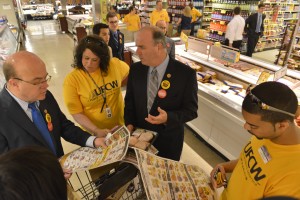June 14, 2013
Local 400 Safeway Members Welcome SNAP Challenge Participants
 This week, 26 members of Congress have committed to living off of a food stamp budget in order to bring awareness to the House Republican cuts to the Supplemental Nutrition Assistance Program (SNAP).
This week, 26 members of Congress have committed to living off of a food stamp budget in order to bring awareness to the House Republican cuts to the Supplemental Nutrition Assistance Program (SNAP).
Already, the SNAP program denies eligibility to 50 million “food insecure households”. But now, proposed changes to the Farm Bill would strip access to the program from an additional 2 million families.
Rep. Barbara Lee (D-CA) and the other congress members participating in the SNAP challenge are addressing this alarming issue by attempting to live off of less than $4.50 a day.
On Wednesday, the challenge participants stopped at a Washington D.C. Safeway, where Local 400 members work, to buy a week’s worth of groceries for about $30. In order to keep to the strict budget of the food stamp program, staples like milk and butter were out of the question. Representative Lee described the difficulty of the trip in an online blog:
“What I’m thinking about most during this trip is that I’m shopping only for myself. When I was a young, single mother, I was on public assistance. It was a bridge over troubled water, and without it, I wouldn’t be where I am today. I spent hours debating what to buy and what to skip, all the while keeping my sons in my mind.”
The proposed changes to the Farm bill will send many single parents who are in this position, into a state of utter uncertainty about how to provide food for their families. A large portion of those affected by the cuts will be under the age of 18.
This is not the first time officials have tried the SNAP challenge, however. Newark’s mayor, Cory Booker did so earlier this year, and Phoenix Mayor Greg Stanton found that adhering to the food stamp budget left him feeling tired, and eventually “unable to focus”. Sen. Chris Murphy (D-CT) admitted that if this was how he had to live, he would likely be a more unpleasant person, due to his state of hunger. He also lost six pounds in just four days.
The conservatives who claim food stamp programs create dependency on government don’t know what its like to go hungry. Some may joke about those who must rely on government programs, but the reality is that many hard-working people cannot make ends meet without them.
UFCW Local 400 President Mark Federici made a statement following the group’s visit to Safeway this week, commending the challenge participants:
“Year in and year out, the SNAP/Food Stamp program proves itself an unqualified success in reducing hunger, alleviating poverty and stimulating the economy. That’s why we are deeply dismayed that the Senate version of the Farm Bill re-authorization cuts SNAP benefits for approximately 500,000 households, and outraged that the House version of the legislation would completely eliminate benefits for two million low-income families. This would be bad enough under any circumstances, but it’s even worse coming at a time when far too many Americans are unemployed and our economic recovery is still shaky.
“The SNAP/Food Stamp Challenge is a critical way for elected officials and other leaders to experience first-hand how hard it is to feed a family on a SNAP budget, and to understand why benefits should be increased, rather than cut. We applaud all the members of Congress who are joining the challenge this week, and we are especially proud that they chose to purchase their groceries at a union shop. They understand that shopping union gets you the most value for your grocery dollar and the best customer service in the industry.
“Local 400 is privileged to join with these members of Congress in educating the public about the persistence of hunger in America and urging lawmakers to restore full funding to the SNAP/Food Stamp program in the Farm Bill.
“We also remind policy makers that the best way to reduce SNAP expenditures is to shop union, and to restore to workers their right to choose collective bargaining. The rise of low-wage employers like Walmart is a big reason why the SNAP program has grown in recent years, because the workers earn so little, they need Food Stamps to feed their families. By contrast, the more workers with union contracts, the fewer workers will need SNAP or any other type of federal assistance. That’s a win-win solution for everybody, because it lowers poverty, eases hunger, bolsters the economy, and improves government balance sheets.”